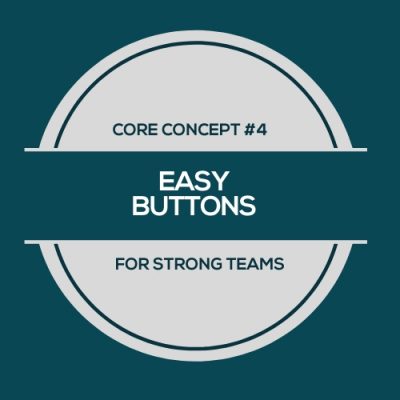Strengths As Easy Buttons For Better Performance
Podcast: Play in new window
Subscribe: Spotify | iHeartRadio | Email | TuneIn | More

How To Get Better Performance Through CliftonStrengths?
Use your strengths like easy buttons. Take one of your job responsibilities or team goals, and ask yourself how you can do it better if you turn up your natural talents.
We notice it all the time: when we highlight someone's natural talents, they realize how things that are easy to them do not come easily to others. In this episode, we refer to this phenomenon as “easy buttons" -- our fourth core concept in this series.
Here at Lead Through Strengths, we love seeing people's potential. It’s an amazing experience to help others realize something special about them, and saying it aloud to them, so that the insight isn't overlooked.
This is because people often find it difficult to notice their very own potential. And so the more we hear responses like “Really? That's a special thing?” or “Oh, I'm good at that?” -- the more we find that strengths development is a meaningful way to help our teams get results.
Embrace What Feels Easy To Get Better Performance
As TyAnn Osborn (one of our favorite strengths facilitators) says, "there's no prize for doing things the hard way."
A lot of people still hold this default assumption that if something feels easy to them, it's probably easy for anyone else. They think it’s nothing special. They dismiss it as they wouldn’t want to offer a bunch of work that’s ordinary or easy. In effect, they are actually depriving their team of their gifts or potentials.
“Why bother? Anybody could have done it anyway.”
If you're a manager, you'll want to mine for their potential and spotlight it. Make each team member aware that what they’ve got is something special. Soon, each person will be able to acknowledge it and use it to contribute to the team.
Once they are convinced that what may be easy for them may actually be a challenge for others, they’ll cease to think that their talent is “unspecial.” They will be more inspired to do more of that.
The more you consistently notice your team members’ strengths, the more they will develop the eagerness to cultivate them. Eventually, they will let their easy buttons get pushed. Those small but meaningful conversations mean that much.
Pushing The Easy Button
CliftonStrengths talent themes show how you naturally think or feel or act at your default. Your reports provide you some words that may serve as clues to make it a little easier to spot your easy buttons for success. Again, while this is a very simple concept, it’s strangely way overlooked in the office.
How exactly do easy buttons work to give you better performance?
What comes easily and enjoyable to you puts you in the strengths zone. And if you’re in your strengths zone, your performance gets strengthened even more.
When we talk about implementing strengths, we normally ask people what comes easily to them. We ask:
What do you find most enjoyable at work?
What were you doing last time you lost track of time?
Usually, people list a few things, but as previously mentioned, they also tend to think that these ways of working are easy, that there’s nothing special about them. “Anybody could do that,” as they would add.
Nevertheless, as we listen to the conversations, we find that the things that are easy and enjoyable to a person tend to be in their strengths zone. But given their default assumptions, they tend to go for what’s challenging or difficult. In their effort to be top performers, they labor through their weaknesses rather than shine in their strengths.
But then again -- as your strengths strengthen your performance, your weaknesses weaken your performance.
Easy Buttons When Turned OFF
Most of the time, working on stuff that's really hard for you is like banging your head against the wall. You keep working hard and fighting the struggle that comes with dealing with things that are:
- not enjoyable
- unnatural
- not intuitive
In other words, these are not the things you typically excel at. If you're a hard worker, you can become competent in your weaknesses, yet it's not an efficient path to your best performance.
Easy Buttons When Turned ON
In order to stand out without draining yourself, you need to be aware of this lever of strengths which, when pulled, leads to:
- better performance
- people acknowledging you like you’re a top performer
- getting your desired outcomes at work
That is equivalent to simply pressing those easy buttons.
Your CliftonStrengths talent themes also represent how you get things done, not what you're choosing to do. So regardless of the job you're in, your easy buttons will tell you how you can approach any outcome to get better performance and results.
Easy Buttons in Teams
Easy buttons vary among people. In sales teams, for example, a benchmark personality type is usually set for the ideal salesperson. Desired types we hear about often include things like:
- The challenger – one who challenges the current beliefs that are embedded in the organization today
- The analyst – someone who is the best at presenting case studies and making stories both relatable and memorable
- The relationship builder - the "people person" who could sell icicles to Eskimos if they wanted to
The truth is, there isn't a templated person who is perfect for the team. Whether they can get results or not is often based on how they use their personal easy buttons.
- Take Person 1, the challenger: This person doesn't simply challenge every idea with a brazen "you're wrong, I'm right" vibe. The excellent challenger makes it a palatable conversation for another person. They likely raise the challenge as an unconsidered insight or a new change on the horizon. For those who are naturally drawn to challenging the status quo, it would be fun to work on maturing this easy button. For example, someone with Strategic likes to simplify the complex abyss of the unknown future. They'd naturally be in that headspace anyway. So making that connection for a prospect is not a heavy lift.
- Take Person 2, the analyst: This is someone who's really great at collecting data, industry facts, case studies, and trends. In a sales engineer capacity, he can brilliantly present data that support how the product has worked for other similar companies. This can lead a client to make a buying decision. They'd naturally study that data anyway. So making that information palatable for a prospect is not a big leap at all.
- Take Person 3, the relationship builder: This is someone who's highly effective at building relationships with people by building rapport and trust quickly. They might even break the ice and make them laugh and have a good time. He may say, “I'm a people person, and it helps me sell because once the relationship is built, we gain trust and efficiency that gives us mutual benefit.”
These are very different easy buttons and you could take any of those three people and they could all learn the other model. They could memorize sales tactics and scripts from the other style.
But for them to achieve their best performance, as a manager you have to help them figure out their easy buttons. By pushing these buttons, you help them towards great outcomes. It's the highest-leverage path to better performance and results at work.
Hearing Excuses?
As you explore this fun concept with your team, you still might feel some resistance or hear excuses like:
“Nope, I'm not doing it your way because that's in my weakness.”
“Nope, not in my strengths zone.”
When you face this scenario, hang in there because that will be tackled in one of the upcoming core competencies.
Key Takeaways
- What you need to accomplish at work is dictated by the job description, but how you do that will largely benefit from talent themes tools. Think of them like easy buttons to help you deliver your responsibility with much better performance results.
- Keep a list of your talent themes somewhere readily visible or accessible. Some ideas include:
- A frame of your Top 5 talent themes on your desk
- As magnets
- As your phone’s lock screen display
- Examples of moments when the "easy buttons" concept comes in handy:
- When you're feeling a little bit stuck and you need something to help you maneuver the situation
- When your default reaction hasn't been working for you and you're looking for a new way out
Your natural strengths are easy for you for a reason. Why choose another way?
Ready For The Next S.T.R.E.N.G.T.H.S. Core Concept?
The 9 Concepts:
Carmie is a professional writer and editor at Lead Through Strengths. Having spent 8 happy years with a nonprofit child organization as a storyteller and sponsorship relations team manager, she continues collaborating with others across the globe for the joy of human development and connection. Her days are powered by coffee, curiosities, cameras (film and digital), music, notebooks, and a cat. Where books are home, she’s home. She calls her Top 5 StrengthsFinder Talents “CLIPS” (Connectedness, Learner, Intellection, Positivity, and Strategic)–you know, those tiny objects that hold connected things together. She’d like to think she’s one.

